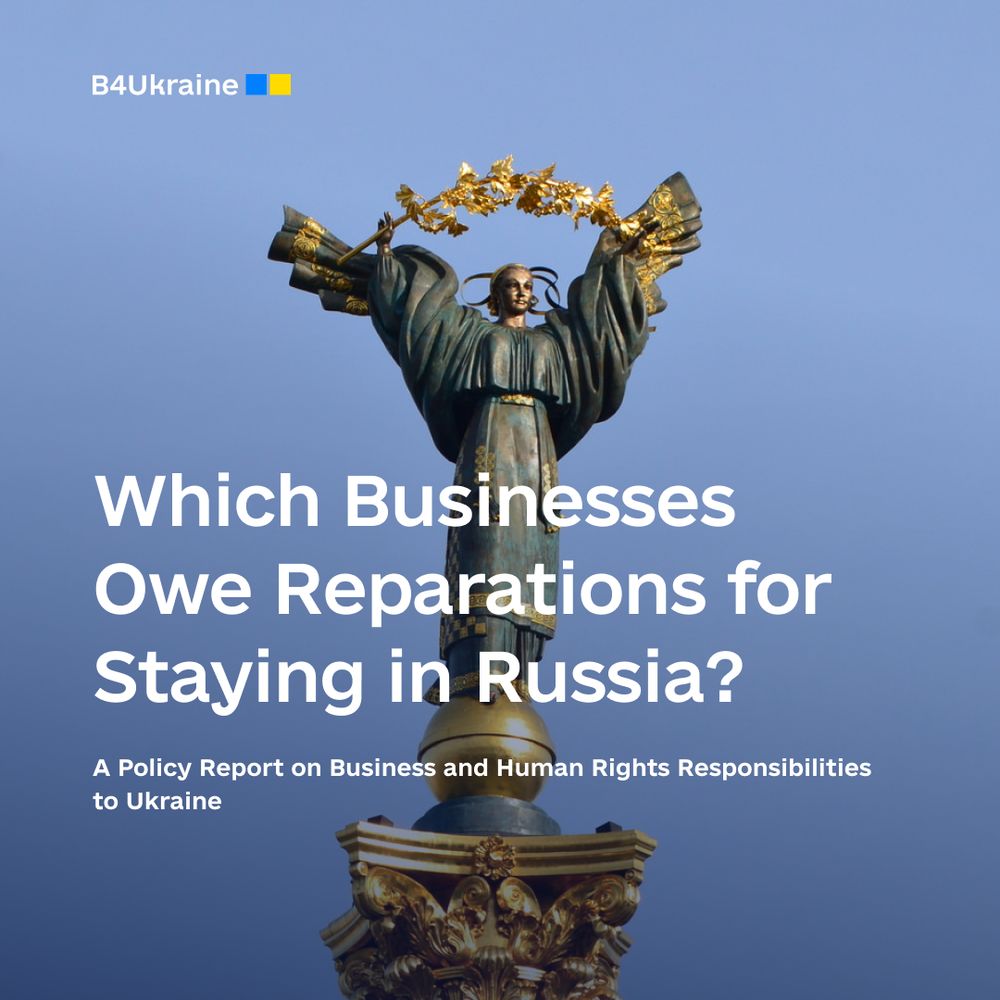
Foreign companies still operating in Russia are not neutral — their actions help sustain and prolong the war, and they may therefore bear responsibility to provide reparations to Ukraine, according to a new study by the Essex Business and Human Rights Project at the Essex Human Rights Centre.
The report titled “Which Businesses Owe Reparations for Staying in Russia?” shows why such businesses may bear responsibility for human rights harms, calls on home states to hold accountable corporate actors who stayed, and outlines what reparations and responsible disengagement should look like. It also highlights how investors can use their leverage to push for accountability.
“We hope this report serves as an important reminder to businesses operating in Russia that their actions and omissions are being monitored. Businesses should not be directly or indirectly contributing to or prolonging an unlawful situation. Those that are doing so today should responsibly disengage, and contribute to Ukrainian reparations programmes,” said Anil Yilmaz, Director of the Essex Business and Human Rights Project.
Key findings:
In conflict-affected areas, businesses should carry out heightened human rights due diligence (hHRDD), meaning that the engagement needs to be both more routine and deeper in understanding the dynamics of the conflict and the relationship the business has with the various actors in the conflict.
A business is expected to account for impacts it causes directly and those it contributes to or is directly linked to through its business relationships. Businesses that are “directly linked to” a harm are expected to exercise their leverage to affect change, but where there is a risk of a severe threat, the business must be able to affect change quickly or they risk moving along the continuum of responsibility and “contributing to” the harm, triggering their remedial responsibilities.
When applying the severity threshold to the Russian invasion of Ukraine, it is possible to expect divestment by foreign businesses from Russia due to the widespread and systematic nature of the violations of international human rights law (IHRL) and international humanitarian law (IHL).
Any assessment of responsibility on the basis of “mere presence” raises significant concerns about how finding mere presence as a contribution could undermine the rights of Russian civilians. However, the report finds that there are situations when staying in an economy can be a contribution despite certain mitigating factors.
It is now established law that where there are serious breaches of international law, other actors must not assist in the maintenance of that illegal situation.
It is crucial for businesses to assess, as part of their hHRDD, whether and to what extent their actions or omissions are assisting in the maintenance and prolonging of the illegal situation created by the Russian state in the context of its invasion of Ukraine.
The hHRDD is an essential process for businesses to assess and weigh the likelihood of whether their continued presence and payment of taxes in Russia is essential to the realization of human rights against how those payments are impacting the conflict and the role they play in financing violations of IHRL and IHL.
Businesses should not assume that payment of taxes is a neutral act in contexts like this and should take seriously the possibility that their contributions to the war economy outweigh the contributions to the realization of rights.
Staying in Russia for an extended period of time may move the business from “directly linked to” to “contributing to” the harm, incurring a responsibility to remediate.
The responsibility to stay in Russia is also not as broad-reaching as some businesses have claimed in defense of continuing to do business in Russia. Simply because a business does something that could contribute to the realization of a human right does not mean that the business is always excused from acting.
IHRL offers significant guidance as to what kinds of rights, interests, and economic activity are essential to preserve even when economic disengagement is otherwise appropriate. In conducting their hHRDD and assessing responsible exit, businesses should be guided by these principles in weighing retrogression against potential contributions to gross violations of IHRL and IHL.
Businesses that have stayed in Russia might be liable to provide reparations if it is established that they have caused or contributed to gross IHRL and IHL violations committed in Ukraine.
As part of a comprehensive and victim-centred reparations programme, it would be appropriate for businesses that stayed in Russia when they should have left to make appropriate contributions.
Home states of foreign businesses have an obligation to regulate their corporate actors operating in Russia and to hold them accountable for staying in Russia when they should have left. These home states should ensure their businesses are contributing to the Ukrainian national reparations programmes and should adopt legislation to facilitate this if they have not already done so.